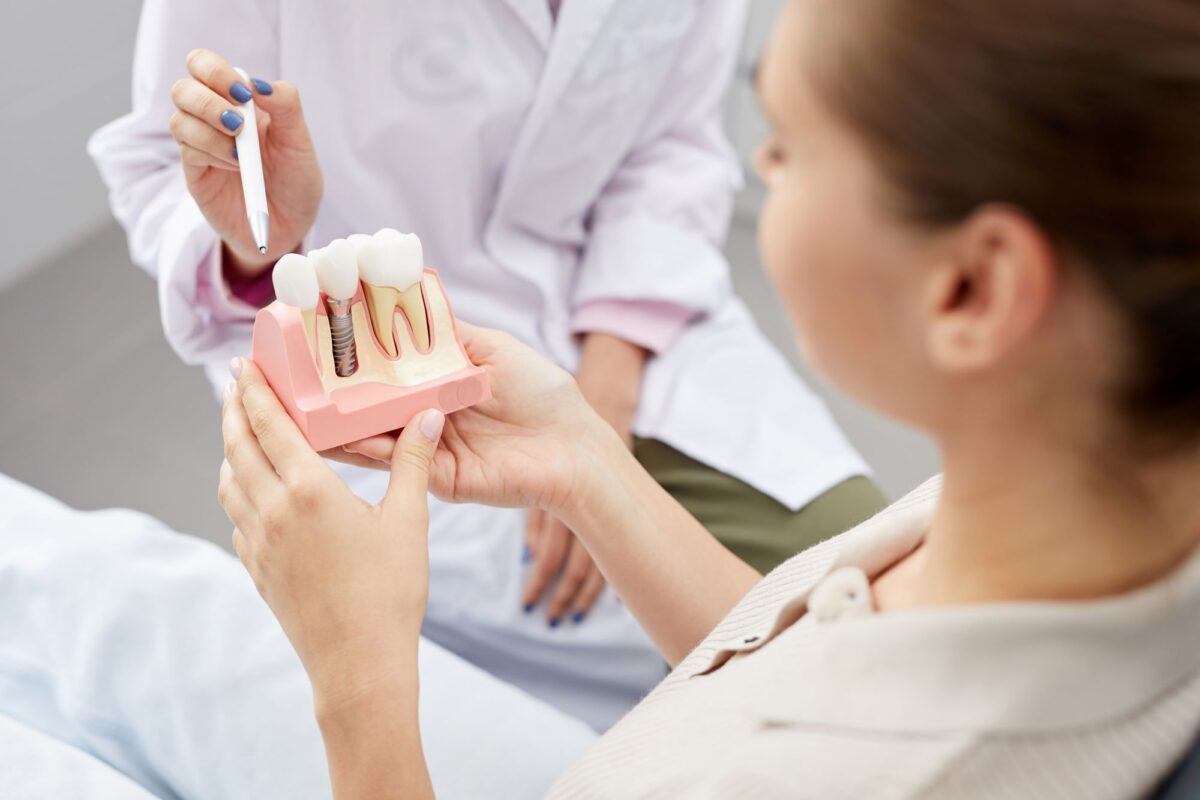Dental implants provide a long-lasting, sturdy solution for tooth loss. However, to ensure their longevity, they require ongoing care and maintenance, much like natural teeth. If neglected, dental implants can suffer from complications like gum disease, bone loss, or implant failure. Therefore, understanding and implementing the correct aftercare regimen is critical for the health and durability of your dental implants.
In this article, you’ll discover the essential aftercare and maintenance tips for dental implants that will help you maintain their structure and integrity for many years to come.
1. Routine Oral Hygiene Practices
You’ve heard it before: brushing twice and flossing once daily is the gold standard of oral hygiene. Don’t ignore this routine when it comes to your dental implants Mississauga. Like natural teeth, they’re highly susceptible to bacterial build-up. Using a toothbrush with soft bristles protects the implants from damage, while a non-abrasive toothpaste prevents scratches.
Moreover, interdental brushes can help clean those hard-to-reach areas around the implant. Antimicrobial mouthwash is another excellent addition to your oral care routine, as it can eliminate harmful bacteria.
Keep in mind, although dental implants can’t get cavities, improper care can still lead to diseases in the surrounding gums and natural teeth.
2. Eating A Balanced Diet
The food you consume directly impacts the health of your teeth and dental implants in Mississauga. Therefore, maintaining a balanced diet isn’t only good for your overall health, but it’s crucial for your dental health as well.
The nutrients you derive from your diet support gum tissue health, reduce inflammation, and strengthen your immune system. They also help in fighting against bacteria and ward off infections, ensuring your implants stay in optimal condition.
To take care of your dental implants, make sure to include the following in your diet:
- Calcium-Rich Foods: Foods like dairy products, leafy greens, and fortified cereals are rich in calcium, which is essential for bone health. Given that implants are directly inserted into the jawbone, a healthy bone structure supports implant stability.
- Vitamin C: Citrus fruits, bell peppers, strawberries, and tomatoes are excellent sources of Vitamin C. This vitamin plays a critical role in collagen production, which aids in the healing process and keeps gums healthy.
- Lean Proteins: Foods like fish, poultry, and tofu are high in protein, which is crucial for repairing and regenerating tissues. These foods can help speed up recovery after implant surgery and support ongoing implant health.
Remember, while a balanced diet benefits your dental health, it is not a substitute for routine dental care. You must continue brushing, flossing, and scheduling regular dental check-ups.
3. Schedule Regular Dental Check-Ups
As you follow your daily oral hygiene practices and maintain a healthy diet, scheduling regular dental visits is crucial in maintaining your dental implants in good condition. Dentists can detect early signs of potential complications.
By identifying and addressing these problems before they escalate, you can prevent any serious damage to your implants. It’s recommended to schedule dental check-ups every six months, or more frequently if your dentist advises.
Additionally, these visits allow for professional cleanings. Unlike brushing and flossing at home, professional dental cleanings can effectively remove tartar, a form of hardened plaque. Tartar accumulation can lead to gum disease, threatening the stability of your implants. Thus, a professional cleaning can safeguard your implants, ensuring their longevity and health.
4. Avoid Tobacco And Alcohol
Tobacco and alcohol consumption can be detrimental to dental implant health. Both substances can weaken your immune system, slow down healing processes, and increase the risk of implant failure.
Specifically, smoking can cause a condition known as peri-implantitis – an inflammatory disease that can cause bone loss around the implant, eventually leading to failure. So, it’s best to quit these habits for the sake of your implant’s health.
5. Special Care For People With Bruxism
If you’re someone who grinds or clenches their teeth, often a condition known as bruxism, you might need extra protection. Grinding puts additional stress on the implants, which can cause damage or failure over time.
If necessary, your dentist may recommend wearing a special mouthguard while sleeping. This guard can help to distribute the pressure evenly, protecting your implants from excessive force.
6. In Case Of Physical Activities: Use Mouthguards
If you engage in contact sports or rigorous physical activities, consider using a mouthguard to protect your dental implants. Any direct trauma can loosen or damage the implant. A small investment in a mouthguard can save you from costly repairs or replacements.
Depending on your needs, there are various types of mouthguards you can consider. One of these is a custom-fitted mouthguard, which offers a higher level of protection than standard ones. Typically, it’s molded to fit your mouth perfectly, ensuring maximum comfort and effectiveness. Although it may cost more than the generic counterparts, the added protection it provides is well worth the investment.
Conclusion
The longevity of dental implants greatly depends on aftercare and maintenance. By embracing a diligent oral hygiene routine, making wise dietary choices, having regular dental check-ups, and taking protective measures, you can ensure the well-being of your dental implants for many years to come.
If you don’t adhere to such practices, you might face complications like gum disease, which can lead to costly repairs and discomfort. So, start implementing these tips today, and let your dental implants shine!

